The story begins with our founder, Mónica Robinson Bours. One of her three children was born with a brain injury, which led her to her extensive training in developmental programs that rehabilitated her son and allowed him to grow into a young man with normal — and even exceptional — intellectual and physical abilities. In 1999, she spontaneously founded Ponguinguiola to share the cumulative expertise and knowledge of child development that she had gained through this intensive rehabilitation process.
In 2000, doors opened to the Children’s Interactive Cultural Museum (Museo Cultural Infantil Interactivo) with our Dinosaurs exhibit, which remained open for a year and half to all schools and to the general public, and which was visited by 80 schools and 13,000 children.
In 2002 we launched the Museum-on-Wheels project so that more schools could access and benefit from the museum. We brought arts and sciences workshops to 80 elementary schools, benefitting 24,116 children in the municipality of Cajeme, Sonora.
In 2004, Ponguinguiola was formally designated as a non-profit organization with the mission of providing accessible education and occupational training for underserved people and low-income communities. Our objective was to empower children and young people through educational programs to respond positively and proactively to their environment. Ponguinguiola initially focused on designing, developing, and offering programs that promoted literacy and reading; through the process of working in the community, however, it became clear that there was also an urgent need to take action to protect the environment, and so the Environmental Education Program (Programa de Educación Ambiental) was created.
Our focus was to deal with the trash program by developing an engaged, active, and responsible citizenry. We pursued this through the following programs:
- The ¡Juega tu Mejor Papel! (“Do Your Part!”) Campaign was launched in 2005 to recycle the massive quantity of schoolbooks and journals that were routinely thrown in the trash at the end of every school year. In the 2007-2008 school year, 57 tons of paper were recovered and repurposed, with more than 100 schools from all grade levels participating. In the 2008-2009 school year, that number grew to 70 tons of paper with 138 schools participating. The recovered paper was channeled through an intermediary into a recycling plant which created products that were returned to the community, such as paper towels, toilet paper, napkins, and more.
- The Por una Navidad Ecológica (“Have a Green Christmas”) campaign launched in 2005 to promote the organic composting of Christmas trees, which was embraced by the community: local malls joined the campaign by acting as collection centers for the trees, and families participated by delivering them for composting after the holiday season. 40% to 60% of all pine trees sold were collected, producing 3-4 tons of organic compost. This project benefited from the participation of three important partners: the malls which served as collection/recycling centers for the pine trees, the city council which transported the collected pines, and the Agricultural Technology Studies Center #38 (Centro de Estudios Tecnológico Agropecuario #38) that made the actual compost through workshops with its students.
- The ¡Que Papelazo! program invited schools to start separating, sorting, and recycling their waste. Ponguinguiola gathered and organized this waste in its collection center and sold it to a recycling plant, then returning that money to the participating schools, churches, and households. Thanks to its great success, this campaign remains active as of 2020 under the leadership of the Universidad La Salle – Ponguinguiola in Ciudad Obregón, Sonora.
A community network was formed through, and thanks to, these projects. Today it consists of more than 157 businesses, 116 schools, 60 organizations and 14 governmental agencies, along with hundreds of families. Thanks to this network, 50 to 60 tons of recyclable materials are removed from the trash pipeline every month.
Ponguinguiola opened its doors in La Paz In 2014, working together with NOS (Noroeste Sustentable) in the fishing community of El Manglito. We have two main branches of work here: children’s workshops, and environmental programs.
The children’s workshops seek to encourage the children’s love and capacity for the written word, to help them better express themselves as well as to understand and respect others’ opinions, and to reinforce their connection to nature and the environment, that they might better be empowered to care for and protect it (and have the scientific training and skills to do so). Between 2014 and 2019, we offered a variety of classes such as:
- I save by recycling
- Reading
- Music
- Music
- Learning About Myself
- Biology: Ocean, Mollusks, Birds, Mammals, Reptiles, and Fish
- Dinosaurs
- Art
- Audiobooks
- The Human Body
- Gardening
- Memory and Focus
- Journalism
- Dance
- Theatre
- Bike riding, bike maintenance, and urban design (with partner organization BCScletos)
During this five-year period we had 72 children participate, 4 of whom graduated from the workshops (after their 11th birthday) and decided to return as volunteers to the same program, along with 11 volunteers and 18 university social services students.
Finally, at the beginning of 2016 the environmental program closed and in its place began preparations for the #Desplastifícate campaign, which launched formally in 2018.
DESPLASTIFÍCATE (or, “deplastify yourself”)
In September 2016, Ponguinguiola - La Paz restructured its programs, understanding that recycling alone does not present a complete solution to the solid waste produced by human activity. On the contrary, it is necessary to work on changing consumption habits as this is the root cause of waste production. For this reason, the decision was made to launch a campaign to reduce the consumption of single-use plastics, specifically: plastic straws, grocery bags, and styrofoam.
Since 2017, the Ponguinguiola team has been coordinating and leading the #Desplastifícate alliance, a partnership of 35 non-profit organizations from the state of Baja California Sur which seeks to change the population’s consumption habits and convince consumers to reject single-use plastics, starting with styrofoam containers, plastic straws, and plastic shopping bags. Through this alliance we seek to promote empathy among the citizens of this state, raising awareness and recognition of the powerful negative impact that our unchecked consumption of these products is having on public health and on the environment.
We focus on the three aforementioned products in particular because of their short functional life, which varies from just 15 minutes of use to up to several weeks, and also because of their highly documented toxic effects on public health such as the use of styrofoam subjected to high temperatures.
To achieve this, the #Desplastifícate alliance followed the subsequent work plan:
In May we undertook a survey to find out how many straws and styrofoam containers were being used in the restaurants and groceries located on the malecón (boardwalk) of La Paz, Baja California Sur, and to use this data to inform our campaign. Among other results, we found the following:
- There are currently 61 food-service businesses (restaurants, bars, ice cream shops, and grocers/convenience stores)
- 2,958 plastic straws are handed out daily
- 1,971 styrofoam containers are handed out daily
Considering the size and number of establishments in the Malecón district, these were alarming results and it was decided to roll out this campaign at a statewide level.
The campaign created informational materials such as tri-fold table cards, bumper stickers, videos, and radio spots. These materials were used to inform the population in general about the issue of single-use plastics; for example, they were placed on tables of cooperating restaurants, bars, and hotels where patrons could review them.
The campaign launched publicly through a press conference on February 2nd, 2018, in the La Paz Cultural Center (Centro Cultural de La Paz) in the city center. This event was assisted by 72 people from the media, participating businesses, government representatives and ambassadors from the 23 non-profit organizations that at the time had been working together since 2017 to establish the #Desplastifícate alliance.
The #Desplastifícate Alliance members decided to create work teams to plan, develop, and take actions along 4 main axes, all in pursuit of the same objective (to diminish and eliminate single-use plastics in the state). We accordingly established the following 4 committees:
- Communication Committee: Social networks (Facebook, Instagram, and Twitter) offer a platform to share important information about the consumption of plastics. We have created some original content, such as two videos and four radio spots as well as visual materials that the participating organizations contribute. We currently enjoy the support of local radio stations who run short ads with information about the #Desplastifícate law and invite the community to adopt new habits that help care for the environment.
- Business Committee: We met with business leaders from various relevant sectors: tourism, hotels and hospitality, producers, restaurants, bars, and ice cream shops. Through these meetings we generated a strategic plan for how to raise awareness in the business community about the issues of single-use plastics and about alternative products that can be used in place of plastic straws, grocery bags, and takeout containers. Finally, we created trainings for businesses interested in quitting their use of disposable plastics and adopting better practices, such as:
- Suggesting and promoting the use of fully compostable products such as cups, takeout containers, and disposable cutlery when necessary (keeping in mind that the ideal practice is to avoid using disposable products whenever possible).
- Avoiding the use of plastic straws, as this is considered a product of low utility, with a short life cycle and incredibly long-lasting, profoundly harmful presence in the environment.
- Reduce the use of plastic grocery bags in order to encourage the use of reusable cloth bags.
- Educational Committee: We believe that children’s education is the most important ingredient in creating change for the better. Children who are made aware of these issues early on can grow into conscientious and responsible citizens that care for and protect public health and the environment, both for future generations and the present ones. The members of this committee come from educational organizations and have undertaken the following actions:
- Co-creation workshops
- #Desplastifícate school curriculum:
A collaboration between Ponguinguiola, the Coastal Institute of Baja California Sur (el Instituto Costero de Baja California Sur), and the “Education for Action” program (Educación para la Acción), whose goal is to offer trainings, outdoor experiences, and project-based learning to middle and high school teachers, principals, and students. This program works by linking regional schools and the state’s Secretary of Public Education (SEP, la Secretaría de Educación Pública) with other organizations. These collaborators are currently working together to develop a series of curricular proposals focusing on sustainability, identity, and sense of place. This includes more specific units of study such as “Biodiversity and Desplastifícate” and “Water and Food Sovereignty.” These curriculums are being developed with the endorsement and oversight of the state’s Secretary of Public Education and are intended to be taught in schools statewide.
- Public Policy Committee: In the political realm, a strategic plan was created and implemented to draft and propose a bill to the State Legislature to pass an Ecological Balance and Environmental Protections Law (Ley del Equilibrio Ecológico y Protección al Medio Ambiente) which would create change at the state level by prohibiting the production, sale, and use of the three target single-use plastic products.
On June 18th, 2018, Representative Maritza Muñoz took the podium to present the bill, taking up the cause of the #Desplastifícate Alliance, which at that time included 35 non-profit organizations along with such bodies as CANIRAC La Paz y Los Cabos and EMPRHOTUR La Paz y Los Cabos. The State Congress unanimously voted to approve the bill and pass the Ecological Balance and Environmental Protections Law of Baja California Sur (Ley del Equilibrio Ecológico y Protección al Medio Ambiente del Estado de Baja California Sur), which prohibits the use of plastic bags, styrofoam containers, and plastic straws. It is worth mentioning that a grace period of 12 months was granted between the passing of the law and the rollout of its enforcement, given the affected businesses (supermarkets, pharmacies, automotive/gas station stops and convenience stores, markets, and restaurants) time to use up the supplies that they had already purchased and replace them with alternative options. Wholesale and retail distributors, meanwhile, were given a period of 18 months to transition to compostable products. The government made an important commitment to phase out use of the three targeted single-use plastic products within 9 months, and transition to using other ecologically-friendly materials both for daily use as well as at meetings and other events.
As of February 20th, 2020, the Official Bulletin of Technical Standards and Practices (Boletín Oficial la Norma Técnica) has published which kinds of plastic, with what qualities and characteristics, are prohibited by law.
To successfully implement and enforce this law, it is necessary to have a municipal program for replacing plastic bags and expanded polystyrene. We are currently working with the Ecology Department for the Municipality of La Paz (Dirección de Ecología del Ayuntamiento de La Paz), in order to facilitate strategies and proposals in this last phase of the transition.
We are a non-governmental organization (NGO) that promotes societal consciousness and empathy for our environment, through educational initiatives in vulnerable communities and statewide environmental education campaigns that encourage ecological care and stewardship for the well-being of Baja California Sur.
A united and empathetic Baja California Sur, which is conscientious about human rights, and which protects, respects, and lives in harmony with its environment and natural surroundings.
Implement non-profit programs of a social nature, offering environmental training and education to benefit vulnerable people and groups, encourage community grassroots efforts and promoting empathy, awareness, respect, and harmony to maintain a healthy and thriving environment in Baja California Sur.
Altruism
We are a humanist organization that acts to benefit others without expecting payment in return.
Learning
Our goal is to facilitate the process of acquiring, processing, understanding, and applying information to benefit the environment.
Autonomy
We authentically and independently develop actions and activities in accordance with our goals and objectives within the limits of the law.
Collaboration
We focus on working in partnership with other people and organizations to take action and achieve our goals for the benefit of the environment.
Commitment
We understand the importance of living up to our promises and act accordingly.
Creativity
We focus on producing original ideas and concepts that are practicable for achieving our goals.
Empathy
Our team makes a great effort to understand others’ feelings and perspective, and to be able to rationally and objectively feel what another is feeling.
Equity
We do not discriminate on the basis of social class, race, gender, or religion. We wish to promote respect for the particular characteristics of all individuals and to uphold justice as a fundamental human right.
Humility / Simplicity
As a team we are aware of our limitations and of the opportunities for growth that surround us, and we behave accordingly.
Gratitude
We recognize and are grateful for the efforts and the participation of all other communities involved in protecting the environment.
Integrity
We always do what we think is right, without harming others’ interests.
Justice
We seek a balance between the good of the individual and that of the collective.
Perseverance
We are steadfast and consistent in our commitment to protecting the environment.
Passion
We promote and motivate empathy and awareness for protecting the environment in our communities.
Leadership
We try to motivate, direct, and lead people to obtain results together.
Resilience / Restoration
We are able to overcome in critical moments and adapt to remain effective even in unusual or unexpected conditions or situations.
Respect
Our team is able to recognize, appreciate, and value others, always keeping in mind that everyone is valid and valuable.
Social Responsibility
We have a commitment, obligation, and duty to freely and willingly contribute to creating a more just society which also protects the environment.
Sincerity/ Transparency
We always act and conduct ourselves with candor, simplicity, and honesty.
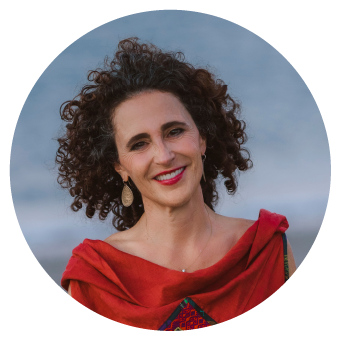
Mónica Robinson Bours Muñoz
Board President
Co-Founder
Born and raised in Ciudad Obregón, Sonora, Mónica found herself in a crisis when her first child suffered a brain injury. She dedicated herself to studying how to rehabilitate him and, in the process, became an expert in childhood development, both physical and intellectual. As her child improved, Mónica found herself drawn to the notion of sharing this hard-won knowledge and her educational resources with her community. To this end, she spontaneously formed a formal organization called Ponguinguiola AC, which currently works to improve the well-being of the Baja Californian people and environment, with more than 20 years working in community efforts.
contacto@ponguinguiola.org
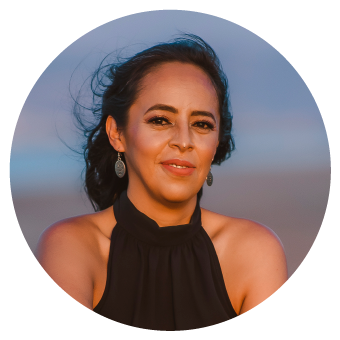
Mayra Victoria Gutiérrez Sandoval
General Director
Mayra is originally from Mexico City, but has been a paceña at heart since 2000. She came to La Paz to study Marine Biology at the Universidad Autónoma de Baja California Sur, seeking ways to care for the marine environment of the region. In 2014 she joined the Ponguinguiola team with the goal of offering environmental education programs, and worked on such projects as ¡Qué Papelazo!, ¡Juega tu mejor papel!, and ¡Yo reciclo y ahorro por mi colonia!. In 2016, she proposed working on a campaign to reduce the consumption of single-use plastics, and this is how she came to start the #Desplastifícate alliance, in which she coordinates the actions developed by the alliance’s four committees: public policy, communication, business, and education.
mayrav@ponguinguiola.org
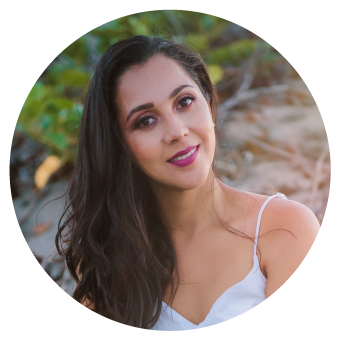
Yamileth Chaidez Lara
Program Coordinator for Environmental Education and Workshop Instructor
Yamileth holds a Bachelor’s degree in Psychology with an emphasis on Education. She has had the fortune of working at Ponguinguiola for more than 5 years, and during this time has learned to care for, maintain a connection to, and take responsibility for the environment. She is excited to share what she has learned to bring about greater awareness, in order that more people realize the importance of caring for the environment and take up this cause. She wishes to plant a seed with the children she educates, that they might grow into empathic, responsible adults who care for their environment.
yamileth@ponguinguiola.org
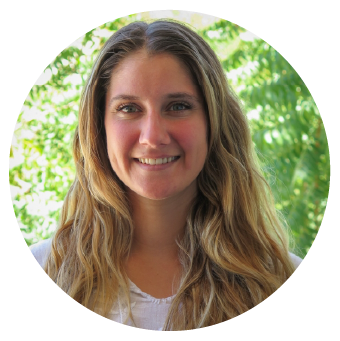
Heidi Whitehouse
Workshop Instructor
Heidi is an elementary teacher from San Diego, California. She holds a B.A. from Reed College and a Master’s of Education from Portland State University. She moved to La Paz because she felt attracted, both personally and professionally, to Ponguingiola as an organization due to its goal of cultivating a more empathic society. She loves Baja California Sur for the incomparable beauty of its marine ecosystem and for the relaxed pace of life.
heidi@ponguinguiola.org
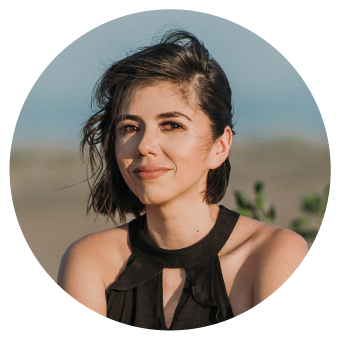
Mariana González Guzmán
Administrative Assistant and Logistical Support
Mariana is a psychologist committed to caring for the environment and establishing a harmonious, sustainable community. She has been working with non-profit and environmental projects for the past 5 years, as part of the administrative (operational and logistics) team. She is inspired to be part of Ponguinguiola thanks to its passionate, determined team with whom she is learning and collaborating to improve our quality of life here in Baja California Sur, this unique and irreplaceable place.
mariana@ponguinguiola.org

Ana Gabriela Galindo Artigas
Bussines Comitee Colaborator
Ana Gabriela holds a Bachelor’s degree in Psychology from the Universidad Iberoamericana in Mexico City. She is passionate about protecting the environment, and this cause motivates her every day to find new ways to improve her consumption habits and reduce her environmental footprint. She became a Ponguinguiola volunteer to maximize her efforts with an organization that fights to transform humans’ environmental impact on a large scale.
gabriela@ponguinguiola.org
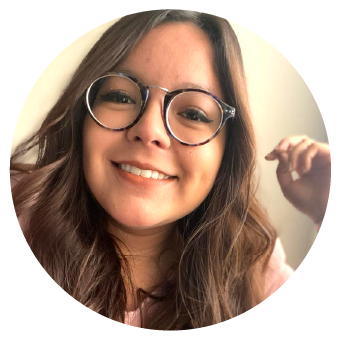
Tannya Marmolejo
Communication and Design
Holds a Bachelor’s degree in Communication from the Universidad Autónoma de Baja California Sur. Collaborator in the realm of communication, design, and social media content.
Thanks for your donations!Make a Donation!
Copyright @2020

